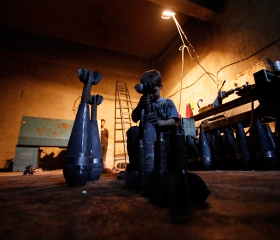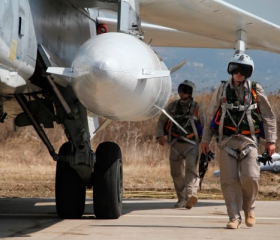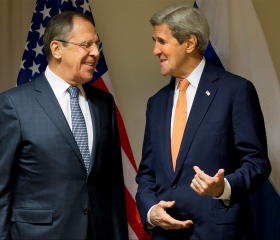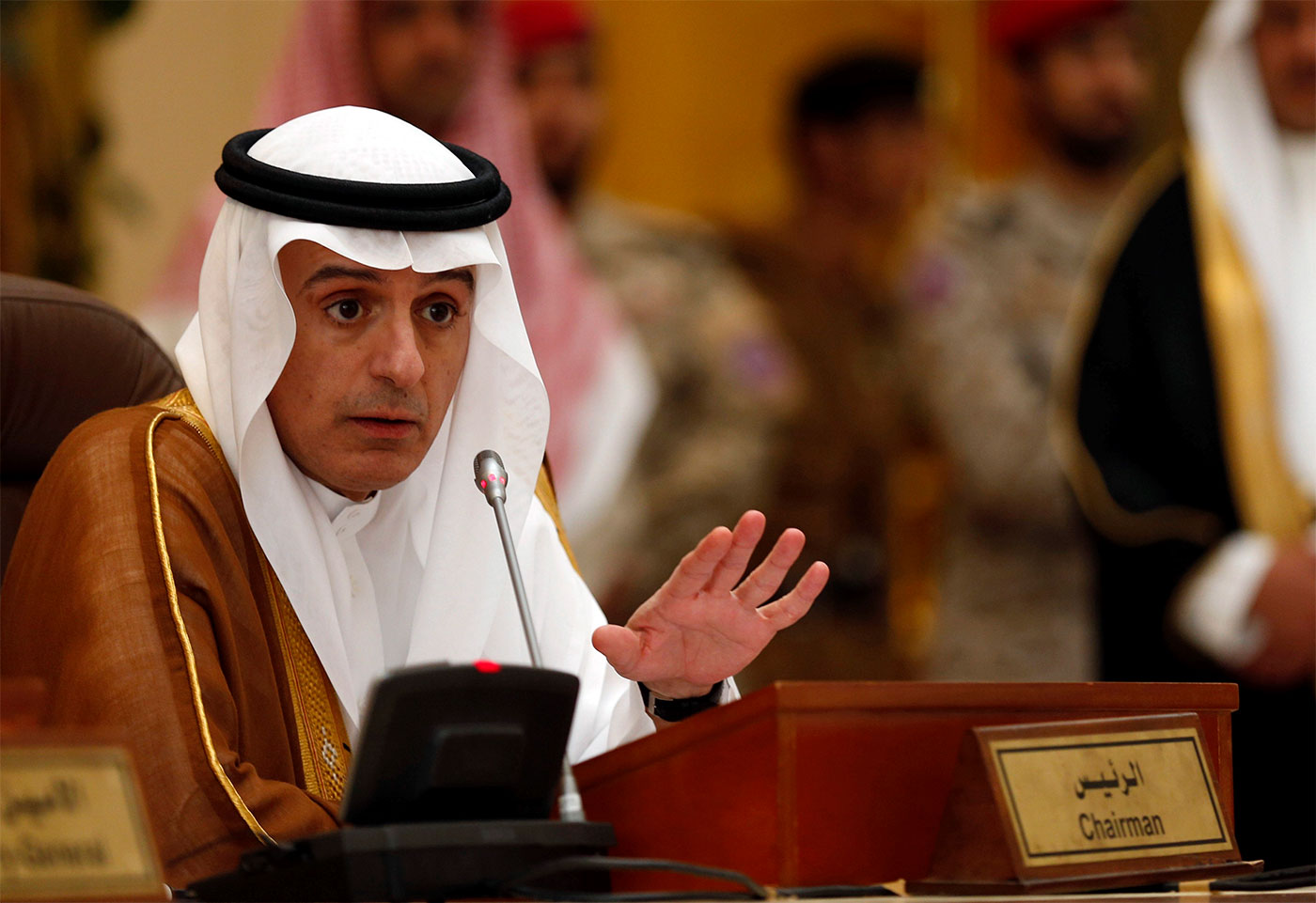It would not be an exaggeration to suggest that the future of international relations as a whole depends on how the situation in the Middle East develops. Right now, attention is focused on more obvious and heated examples of regional instability. Solutions are being sought to a range of complex issues, including the long-standing civil war in Syria, the settlement of internal conflicts in Iraq, Libya and Yemen, and the restart of the Israel–Palestine peace process. New and extremely dangerous forms of international terrorism are springing up all over the region. And migration flows are growing at an unprecedented rate, causing problems for neighbouring countries and entire continents.
Meanwhile, despite the significance of these difficult issues, in the end they all are manifestations of a fundamental crisis of security and statehood in the Middle East. It is clear that without reforming this system in one form or another, we can hardly hope to overcome the various consequences of the current crisis.
The Historical Background
For a long time, the Middle East was not a self-sufficient region in terms of guaranteeing its own security; security (and the majority of security threats) tended to be a kind of regional import provided by external forces. In the period between the Suez Crisis in 1956 and the “Desert Storm” operation to liberate Kuwait in 1991, the region was the focal point of Soviet–American confrontation; the Middle East was one of the major components of the bipolar world, an arena of competition and limited cooperation between the two global powers. The second period, starting from the end of “Desert Storm” in 1991 up to the beginning of the so-called “Arab Spring” in 2010–2011, was characterized by U.S. hegemony in the region and US attempts to preserve and even strengthen this hegemony.
Despite their obvious differences, these regional security frameworks had a number of important common features. First, the states in the region remained the main elements of this system, and the most significant threats to security were the result of tensions and conflicts between states. Accordingly, the system itself was based on creating regional balances – between the Arab countries and Israel, between Iran and Iraq, etc. Significant imbalances led to armed conflicts.
Second, external players served as the guarantors of security and stability in the region – originally the Soviet Union and the United States and later the United States, on a unilateral basis. Moreover, the region was always of particular value to these external guarantors of security, which dictated and justified their strong economic, political and military presence. The Middle East remained a priority of their foreign policies, and these external guarantors were prepared to invest significant material and political resources in the region.
Third, authoritarian regimes in most of the countries in the region are very stable: the very same leaders (or a narrow clan groups) have been in power for decades; mass social protests are successfully prevented or suppressed; and overt threats to the statehood of these countries have occurred only in exceptional cases. On the whole, the foreign policy direction of the countries in the region has also remained stable; when they have changed (Egypt’s sudden turn from the USSR towards the United States in the mid-1970s, or Iran’s move away from US influence after the fall of the Shah’s regime in Iran in 1979), external guarantors have managed to maintain the overall regional stability by correcting bilateral and multilateral balances within the system.
The Changing Rules of the Game
At the beginning of the 2010s, the once immutable foundations of regional security became fragile and unstable. The “perfect storm” arrived for the countries, in which practically all the features of the regional system mentioned above stopped functioning simultaneously. The stability of a whole range of authoritarian Arab regimes collapsed as a result of the Arab Spring. And the authoritarian regimes in the region were not replaced by stable democratic political systems.
The main threats to security in the region are now more likely to come from within individual states, rather than as the result of relations between states. Social movements and groupings have become the main destabilizing factor, even though they rely on support from individual countries in the region and external forces. The region was not prepared for this fundamentally new challenge.
On the other hand, the interest of the last external hegemon in maintaining its large-scale presence in the region, which many of the local elites now take for granted, has become questionable. The US political and intellectual elite have clearly become “tired of the Middle East”, and doubts have arisen about the ability of the United States to influence the overall negative trajectory of the region’s development. Against the background of the “shale revolution” and the fact that the United States has achieved energy self-sustainability, it is becoming increasingly difficult to justify the Middle East as a priority of Washington’s foreign policy. And because an alternative external hegemon is unlikely to appear any time soon, the United States leaving the region, even if only partially, would mean the inevitable end of regional security framework that has been in place since the early 1990s.
It is worth noting here that over the past 25 years of US hegemony no effective system of multilateral regional security institutions has been developed. The existing regional organizations (the Arab League and the Cooperation Council for the Arab States of the Gulf) are today unable to assume the main functions for ensuring security in the region, as was clearly demonstrated during the recent conflicts in Libya and Syria.
Another factor that has complicated matters for the region is the drastic decline of energy prices in 2014–2016. It is not difficult to predict that this will lead to a sharp deterioration of social and economic problems, not only in countries that export gas, but in the entire Arab world. Threats to internal political stability will intensify as a result.
The drop in oil prices has come at a time when the region’s role in global energy pricing has become less significant. The latest example is the recent crisis in relations between Saudi Arabia and Iran, which despite the numerous predictions, had no effect whatsoever on the general downward trend of oil prices. The golden days of the Organization of the Petroleum Exporting Countries (OPEC) and the Persian Gulf states manipulating oil prices is long gone.
What does this new situation mean for security in the region and the neighbouring countries?
Triumph of the Pessimists
Today the dominating trend in discussions on the Middle East, both in Russia and in the West, can be described as the triumph of pessimism. The Middle East is entering a prolonged period of instability, fraught with multiple conflicts, the retracing of state boundaries, social and economic upheavals.
Looking at this long-term negative scenario for the region’s development, it would seem that the prospects for creating a new and stable security system are similarly vague. If the situation continues to develop this way, then the region will inevitably become a battleground for “regional superpowers” (Saudi Arabia, Iran, Turkey and to a certain extent Israel), which will compete with each other for the right to create spheres of influence, using the support of their “clients”, to the detriment of regional stability.
If this is the future that awaits the Middle East, then all the external players can realistically hope to limit the inevitable damage and stop the negative consequences of Middle East instability from spilling out into the rest of the world. It is precisely this logic today that justifies the involvement of global superpowers in the fight against Daesh (defeat terrorism abroad to prevent it from reaching home). And it is this logic that is behind the priority task to prevent the proliferation of weapons of mass destruction in the Middle East (the elimination of chemical weapons in Syria, finding a resolution to the Iranian nuclear issue): the presence of weapons of mass destruction in an unstable region creates potential threats for both the region itself, as well as for the entire world.
But to what extent is it possible to minimize the negative consequences that instability in the Middle East could have for the rest of the world? Can bombing Syria and Iraq really prevent new terrorist attacks from being carried out in Europe? Can the migrant flow from the Middle East be stopped without restoring stability to the region? How can a cordon sanitaire work in modern global and interdependent world?
The Principles of a New System
Let us try to go beyond the usual pessimism. Let us attempt to imagine what a new security system in the Middle East could look like. It is clear that such a system should be inclusive, involving all the countries in the region, as well as the Arab world’s closest neighbours – Israel, Iran and Turkey. An alternative suggested by some experts is the creation of a defence union of Arab countries, like an “Arab NATO”, led by the Sunni regimes in the Persian Gulf. This is unlikely to bring security to the region, however, as it would involve reproducing the archaic system that existed in the Middle East during the Cold War, pitting the Arab world against its traditional regional opponents.
It is also clear that an effective system should be comprehensive. That is, regional military and political problems should not be separated from social, economic, energy, religious and humanitarian issues. The “three baskets” (security, economics and humanitarian cooperation) that was the basis for the Helsinki Process in Europe 40 years ago could, with obvious reservations to regional specifics, become the foundation of a new collective security system in the Middle East.
The basic principles of the Helsinki Process – refraining from the threat or use of force to resolve contentious issues, respect for sovereignty and the territorial integrity of states in the region, peaceful settlement of territorial and border disputes and fulfilment of obligations in good faith under international law – are no less relevant for the Middle East today than they were for Europe in 1975.
Of course, the military situation in the Middle East is decidedly more complicated than it was in 1970s Europe. The region does not have two opposing military and political blocs, or even a comprehensive system of nation states. But even in this difficult situation, surely it is possible to identify mutual obligations in the military sphere. For example: opening a dialogue on military doctrines, holding regional meetings of defence ministers, setting up “hotlines” between national defence departments. Surely it is possible to come to an agreement on giving advanced notice with regard to military exercises and flights, being present as observers at such exercises, and notifying each other about purchases of large quantities of weapons.
It would seem that the time is more than right to start the practical process of disarmament in the Middle East, which is becoming one of the most militarized regions of the world. The first steps in this direction could be: the creation of a demilitarized zone; prohibiting states from the destabilizing activity of accumulating conventional weapons, including anti-missile systems; and a balanced reduction of the armed forces of the major military powers in the region and the surrounding area. Perhaps it is time to revisit plans to turn the region into weapons of mass destruction-free zone, even if it will take some time to put these plans into practice.
The regional security agenda will be incomplete if we do not include non-traditional threats – the war against international terrorism, illegal drug and arms trafficking, organized crime and illegal immigration. Each of these areas should have its own international regime, with established procedures and participants.
Milestones
Obviously, the first step in the creation of a new security system in the region should be to consolidate all the powers that are interested in eliminating the real danger presented by the hotbed of international extremism and terrorism that is the Middle East. The war against international terrorism is the very foundation upon which other more systemic and complex structures of regional security can be built. This would at the same time serve as a mechanism for restoring trust among the states in the region, for without trust there is no hope of building a security system in the first place.
We need to shift the war against international terrorism from its current format of isolated operations to one that contains a unified strategy and is spearheaded by the UN Security Council. It is extremely important to rebuild a solid international legal framework for the fight against terrorism, one that is free from double standards.
Once terrorism has been eliminated (or once the process is under way), we need to turn our attention to resolving the crises in Syria, Iraq, Libya and Yemen. Negotiations must be launched immediately upon the settlement of the Israeli–Palestinian conflict, which has become a chronic source of instability in the region that has spilt over into neighbouring countries and beyond.
These efforts will provide the parties with a wealth of experience in multilateral cooperation and increase mutual trust among them. This should be followed by the work of an Initiative Group to organize an International Conference on Security and Cooperation in the Middle East. The group should agree on the geographical scope of the future security system, its participants and agenda, the level of representation and the venue for the upcoming forum. It should also prepare draft resolutions, including definitions of security, trust and control measures.
And this work needs to be started right away, so that the peoples of the Middle East can see real prospects for peace and security in the region.









